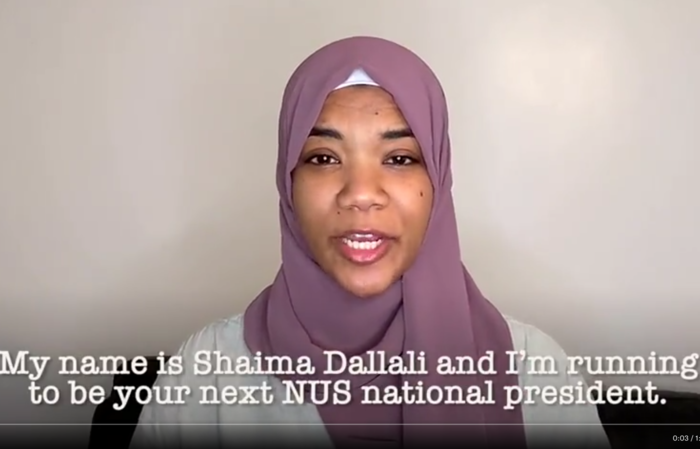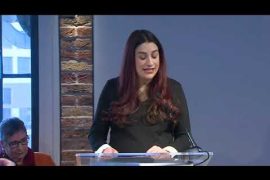In an April 20th Guardian article (“New NUS leader welcomes antisemitism inquiry, but fears for her safety”) Sally Weale, the outlet’s education correspondent, casts Shaima Dallali, the new president of the National Union of Students (NUS), as a victim while downplaying her record of antisemitism.
Readers are told that the current investigation into antisemitism within the NUS , prompted complaints from Jewish student organisations, including the Union of Jewish Students (UJS), and a letter signed by 21 former NUS presidents, has made Dallali feel “unsafe”. The article then quotes her saying she’s been “misrepresented since her election and denied that she was antisemitic”.
However, the only example of Dallali’s antisemtism by cited by the Guardian is a Twitter post from 10 years ago which read: “Khaybar Khaybar O Jews … Muhammad’s army will return Gaza”, referencing the Muslim massacre of the Jews of the town of that name in northwestern Arabia in 628 CE.
Weale then writes:
Dallali has apologised for the tweet, saying she is not the same person she was then and has since changed the language she uses to talk about the Israel-Palestine conflict.
However, the Guardian fails to cite widely reported evidence that she hasn’t in fact “changed the language she uses” to talk about the conflict. As the Jewish Chronicle reported, at the height of the war between Israel and Hamas last year, Dallali tweeted a justification for Hamas terror, writing: “Palestinians have a right to resist by all means possible — even with weapons — this right is acknowledged in international law — Hamas did not start the aggression, what would you like them to do for example?”
This post came just two days after three Israelis were killed when a barrage of rockets were fired from Gaza at Tel Aviv.
That Arabic language post, translated for the JC by CAMERA Arabic, continued: “Does this serve the Palestinian Cause? An important question. To my point of view the answer is according to your opinion regarding the solution of the cause — but armed resistance is a right and we should accept this.”
On May 29 last year, the Dallali tweeted: “From the river to the sea,” a chant understood as a call for Israel’s destruction. And, the same month, Dallali also wrote: “Good morning to everyone except Zionists, settler colonialist and apartheid sympathisers. Free Palestine.”
Further, in an 2018 article, she praised, as a “moral compass for the Muslim community at large”, Egyptian Muslim Brotherhood cleric Yusuf al-Qaradawi, who’s banned from entering the the US and UK due in part to his support for suicide bombings. Al-Qaradawi also prayed for “every last” Jew to be killed. Though the Guardian article, in the penultimate paragraph, alluded to her support for the hate preacher, it referred to him as “homophobic”, though not antisemitic.
In addition to the Guardian’s obfuscation of Dallali’s record of antisemitism, a more recent article in The Times did so as well. A May 5 article (“Students say NUS chief Shaima Dallali is ‘victim of a smear campaign’ over antisemitism”) by Education Editor Nicola Woolcock similarly opened with charges of the alleged “smear campaign” against her, whilst, like the Guardian, only citing the one example of antisemitism from 10 years ago.
In the Guardian article, Dallali is quoted thusly about the putatively unfair criticism she’s faced since assuming the role of NUS president, without being challenged by the journalist:
“Unfortunately, as a black Muslim woman, it is something that I expected because I’ve seen it happen to other black Muslim women when they take up positions in the student union or the NUS, where they are attacked based on their political beliefs or their pro-Palestinian stance.”
As we’ve demonsrated, the criticism she’s faced from Jewish students and others has nothing to do with her gender, race or religion, and has everything to do with her well-documented record of peddling antisemitic rhetoric and expressions of support for violence and extremism.
Related Posts




